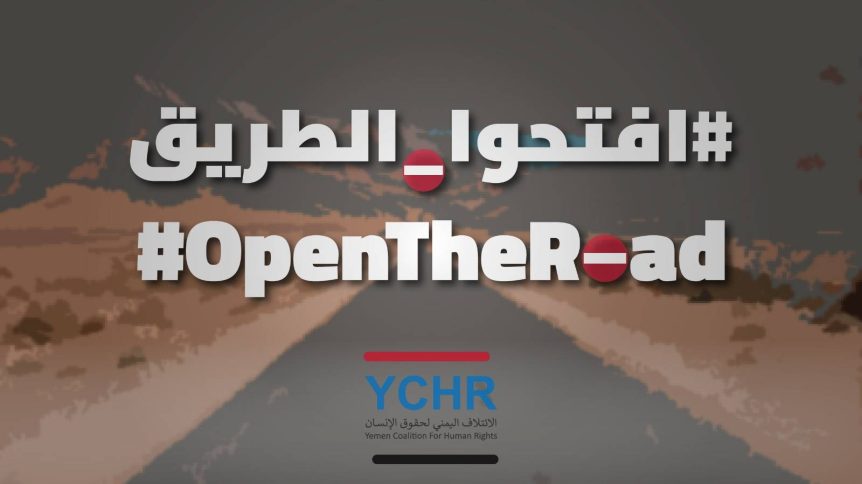On 17 January 2024, the formation of the Yemeni Coalition for Human Rights was announced by seven Yemeni organizations in partnership with the Cairo Institute for Human Rights Studies. A key objective of the coalition is to improve human rights conditions in Yemen through the development of joint local advocacy campaigns. The protection of civilians will be a priority in all the coalition’s activities and events. Today 29 January, the coalition launched this year’s signature campaign: #OpenTheRoad. In its advocacy and media campaigns throughout this year, the coalition will adopt a single core demand: Open the road, not only for the transport of urgent humanitarian aid, vital goods, and water, but open the road also to security, stability, and guarantees of civilian rights and freedoms.
Through an array of events, tools, and activities, the campaign highlights the ongoing infringements and abuses of civilian rights by all warring parties. These parties have blocked paths to civilians’ basic needs, whether by physically closing roads to prevent them from accessing vital material needs like water, food, and medicine or by denying them, through repressive means, the human essentials of security, stability, and fundamental freedoms.
“The #OpenTheRoad campaign will commence by highlighting the pivotal Marib–Sana’a Road, which links the capital, Sana‘a, with the center of oil and gas wealth,” said Yasmine al-Saleh, the coalition coordinator. “The road is a lifeline and strategic corridor for trade and transport, and it is one theater of the ongoing conflict between Ansar Allah, known as the Houthis, and the internationally recognized Yemeni government that controls Marib. This is a conflict in which civilians pay the price every day with their lives and freedoms.”
Since the beginning of the war nearly a decade ago, the Marib–Sana‘a Road has been the site of numerous battles and clashes. The bombardment and destruction has resulted in the closure or disruption of the route, forcing travelers to take unsafe, alternative roads. After the Houthis took control of the Jawf governorate in 2015, the road became a frontline in the confrontation between Houthi forces and internationally recognized Yemeni government forces. The situation has had adverse impacts on the lives of civilians, compounding the dire economic and humanitarian crisis and the threat of famine. It has prevented civilians, especially women, from accessing hospitals and medical facilities and disrupted the movement of goods and humanitarian assistance, further damaging the already ailing economy and sending the cost of scarce goods soaring amid the war.
The closure of roads compels travelers, traders, and humanitarian organizations to use alternative routes like the Jawf and Marib desert roads, which are unpaved and unsafe. These roads pass through arid areas, some of which are under the control of armed tribes and bandits. Attacks and clashes are frequent along these roads, and the warring parties exploit the situation to besiege and starve civilians, cut off their water supply, or use them as bargaining chips in the conflict. The lives and security of civilians are greatly imperiled as armed groups controlling these roads engage in the extortion of civilians, theft, kidnapping for ransom, and killing. Furthermore, the cost and time it takes to navigate the long alternative routes is greatly increased, and these alternative roads cannot be used to transport the sick, the injured, the elderly, and children, thus denying them urgent health care and educational and medical services.
The #OpenTheRoad campaign, which the coalition will pursue in its media and advocacy activity throughout the year, at both the local and international levels, adopts a basic demand: Open all closed roads between the cities and governorates of Yemen, including the Marib-Sana’a Road and the road to Taiz, and lift the war blockade, giving safe and easy access to vital goods, food, water, fuel, and medicine. This will alleviate the suffering of millions of civilians, especially women and children, by ensuring their freedom of movement, guaranteeing their access to humanitarian aid and adequate healthcare, and protecting their right to life, security, and physical and psychological safety.
Share this Post

